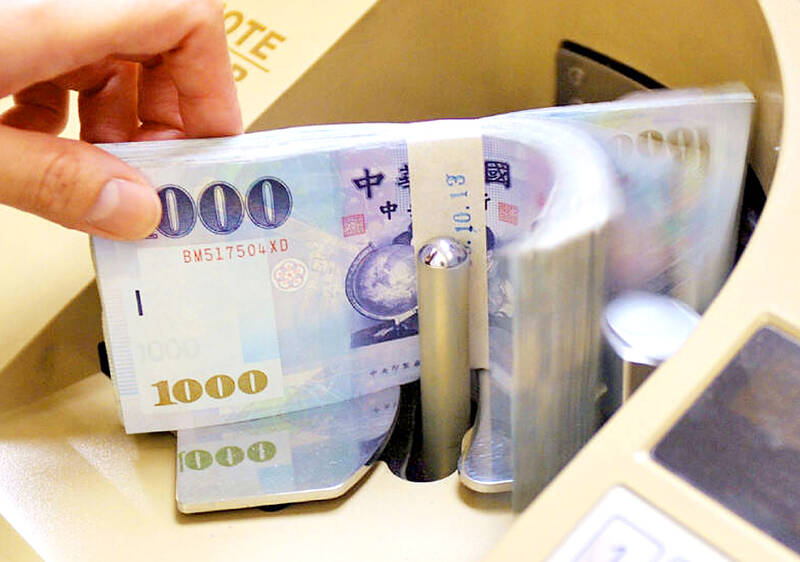Taiwanese entry-level workers last year earned an average monthly salary of NT$37,000, a 6.4 percent increase year-on-year, Ministry of Labor data showed.
Last year, 147,000 people entered the workforce, down 9,000 from the previous year, the ministry said in a statement on Wednesday.
The ministry said that 45.7 percent of all entry-level workers were male, 71.7 percent were college-educated, 19.5 percent had graduate-level degrees, 5.9 percent had high school or high-school equivalent education and 2.7 percent had vocational-school education.

Photo: Taipei Times
New workers with graduate degrees on average earned a salary of NT$52,000 a month, new college-educated workers earned NT$34,000 a month and new high-school educated workers earned NT$29,000 a month, it said.
The minimum wage last year was NT$27,470, it added.
Gender inequality in income remained largely the same, as women entering the workforce on average earned NT$36,000 a month, or 91.3 percent of their male counterparts’ pay, the ministry said.
That figure marked an 8.7 percent gender pay gap, which increased to 10.4 percent in the manufacturing sector, it said.
Women fared slightly better in 2023, when the average income of new female workers was 91 percent of their male counterparts, it added.
New workers with graduate degrees last year earned an average of NT$59,000 a month in the media and information technology sectors, and NT$58,000 in the manufacturing sector, the ministry said.
The same year, new workers with college degrees earned NT$40,000 a month in the medical care and services industries, and NT$38,000 in the financial and insurance industries, it said.
The ministry said graduate-degree holders who entered the hospitality sector increased 7.5 percentage points, while college graduates who entered the construction sector increased 5.6 percentage points, it added.
The data was derived from pension payments for private and public-sector workers, counting only full-time work, the ministry said.

Beijing could eventually see a full amphibious invasion of Taiwan as the only "prudent" way to bring about unification, the US Department of Defense said in a newly released annual report to Congress. The Pentagon's "Annual Report to Congress: Military and Security Developments Involving the People's Republic of China 2025," was in many ways similar to last year’s report but reorganized the analysis of the options China has to take over Taiwan. Generally, according to the report, Chinese leaders view the People's Liberation Army's (PLA) capabilities for a Taiwan campaign as improving, but they remain uncertain about its readiness to successfully seize

Taiwan is getting a day off on Christmas for the first time in 25 years. The change comes after opposition parties passed a law earlier this year to add or restore five public holidays, including Constitution Day, which falls on today, Dec. 25. The day marks the 1947 adoption of the constitution of the Republic of China, as the government in Taipei is formally known. Back then the Chinese Nationalist Party (KMT) governed China from Nanjing. When the KMT, now an opposition party in Taiwan, passed the legislation on holidays, it said that they would help “commemorate the history of national development.” That

Trips for more than 100,000 international and domestic air travelers could be disrupted as China launches a military exercise around Taiwan today, Taiwan’s Civil Aviation Administration (CAA) said yesterday. The exercise could affect nearly 900 flights scheduled to enter the Taipei Flight Information Region (FIR) during the exercise window, it added. A notice issued by the Chinese Civil Aviation Administration showed there would be seven temporary zones around the Taiwan Strait which would be used for live-fire exercises, lasting from 8am to 6pm today. All aircraft are prohibited from entering during exercise, it says. Taipei FIR has 14 international air routes and

Snow fell on Yushan (Jade Mountain, 玉山) yesterday morning as a continental cold air mass sent temperatures below freezing on Taiwan’s tallest peak, the Central Weather Administration (CWA) said. Snowflakes were seen on Yushan’s north peak from 6:28am to 6:38am, but they did not fully cover the ground and no accumulation was recorded, the CWA said. As of 7:42am, the lowest temperature recorded across Taiwan was minus-5.5°C at Yushan’s Fengkou observatory and minus-4.7°C at the Yushan observatory, CWA data showed. On Hehuanshan (合歡山) in Nantou County, a low of 1.3°C was recorded at 6:39pm, when ice pellets fell at Songsyue Lodge (松雪樓), a